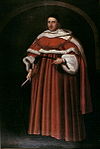Portal:University of Oxford/Selected biography/18
Sir Matthew Hale (1609–1676) was an influential English barrister, judge and jurist most noted for his treatise Historia Placitorum Coronæ. He studied at Magdalen Hall, Oxford and became a barrister, representing various Royalist figures during the English Civil War. His reputation for integrity saved him from repercussions under the Commonwealth of England and Oliver Cromwell made him a Justice of the Common Pleas. He was noted for his resistance to bribery and his willingness to make politically unpopular decisions which upheld the law. When Charles II was reinstated, Hale was made Chief Baron of the Exchequer and then Chief Justice of the King's Bench. In both positions, he was again noted for his integrity, although not as particularly innovative. Hale is almost universally appreciated as an excellent judge and jurist, with his central legacy coming through his written work, published after his death. His Analysis of the Common Law is the first published history of English law and a strong influence on William Blackstone's Commentaries on the Laws of England, whilst his jurisprudence struck a middle-ground between Edward Coke's "appeal to reason" and John Selden's "appeal to contract", while refuting elements of Thomas Hobbes's theory of natural law. His thoughts on marital rape, expressed in the Historia, continued in English law until 1991, and he was cited in court as recently as 1993. (more...)

